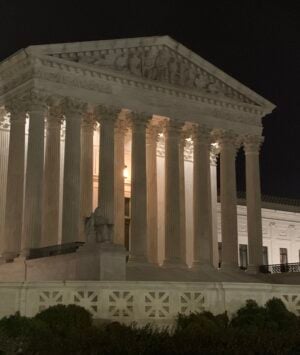[ad_1]

(Photo by Staci Zaretsky)
Chief Justice Roberts was right. The role of the Court, especially in this recent session, has been to call balls and strikes. And their model umpire has been Laz Dias. That’s why, despite all of the feigned appeals to neutrality and self-restraint, people who have been paying attention to the Court have been able to predict the outcome of most of the hot cases with stellar advocacy. For example, affirmative action in higher ed was effectively overruled on June 29th, 2023, but we all know it really was over and done with on October 27th, 2020. And as telling as it is for Harvard professors to be the ones telling us that the Court’s legitimacy has gone belly up, the ship has really sailed when some of the harshest criticism is coming from the Court itself. From Reuters:
Several sitting Supreme Court justices themselves – the court’s liberals – indicated that they agreed with the increasing criticism of the current court, including concerns about the erosion of the Supreme Court’s fundamental legitimacy as a policy-making institution.
The court’s decision in Students for Fair Admissions v. Harvard was an “unjustified exercise of power,” Justice Sonia Sotomayor wrote in the liberal justices’ June 29 dissent.
Mind you, “unjustified exercise of power” is the very polite version of ‘We do not have the constitutional authority to do this.” I’d say the same about the Court’s decision to hear and rule on 303 Creative like the Article III requirement that a case be concrete, particular, and actual, but case or controversy clause be damned.
At other points, the dissenters argued that the conservative justices were simply enacting “their policy preferences” and “value judgments,” with an “unrestrained disregard for precedent.” They added that the court is essentially engaged in white grievance politics and embracing the “myth” of reverse racism; and that its rulings are an insult “to the dignity of those students for whom race matters” and the dignity of LGBTQ Americans.
It is hard to disagree with that assessment — the Court showed how much they care about precedent in Dobbs and Bruen. Their commitment to policy preferences and value judgments are much stronger than their commitment to little things like Congressional intent. In Sackett, they just rewrote the part of the Clean Water Act they didn’t like. In Bremerton, the majority ignored the parts of the record that showed the coach forced and pressured kids in to praying because f**k the establishment clause.
Sotomayor, Kagan, and Jackson would be best getting used to writing those fiery dissents, because that’s about the only recourse left for anybody who is less than happy with the Court’s new role as a six-person legislature with no binding code of ethics, clear commitment to the facts of the case, or standing doctrine.
Even Some Justices Are Raising Questions About The U.S. Supreme Court’s Legitimacy [Reuters]
 Chris Williams became a social media manager and assistant editor for Above the Law in June 2021. Prior to joining the staff, he moonlighted as a minor Memelord™ in the Facebook group Law School Memes for Edgy T14s. He endured Missouri long enough to graduate from Washington University in St. Louis School of Law. He is a former boatbuilder who cannot swim, a published author on critical race theory, philosophy, and humor, and has a love for cycling that occasionally annoys his peers. You can reach him by email at cwilliams@abovethelaw.com and by tweet at @WritesForRent.
Chris Williams became a social media manager and assistant editor for Above the Law in June 2021. Prior to joining the staff, he moonlighted as a minor Memelord™ in the Facebook group Law School Memes for Edgy T14s. He endured Missouri long enough to graduate from Washington University in St. Louis School of Law. He is a former boatbuilder who cannot swim, a published author on critical race theory, philosophy, and humor, and has a love for cycling that occasionally annoys his peers. You can reach him by email at cwilliams@abovethelaw.com and by tweet at @WritesForRent.
[ad_2]




